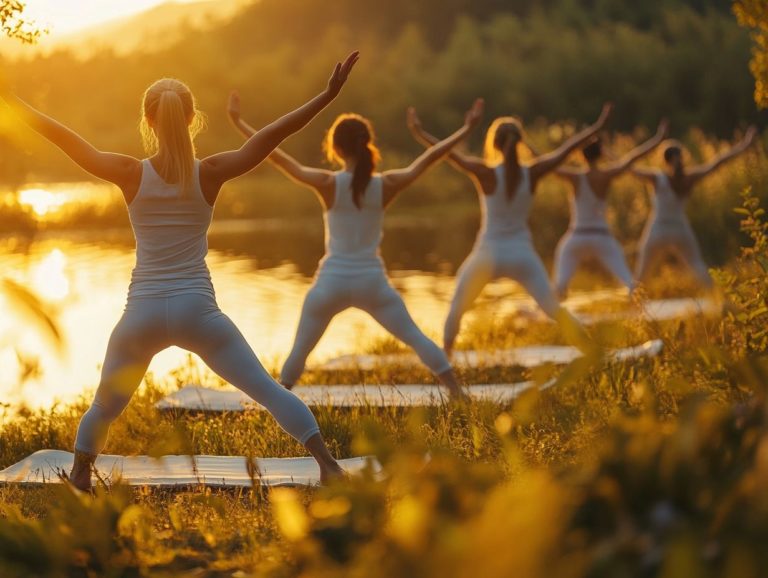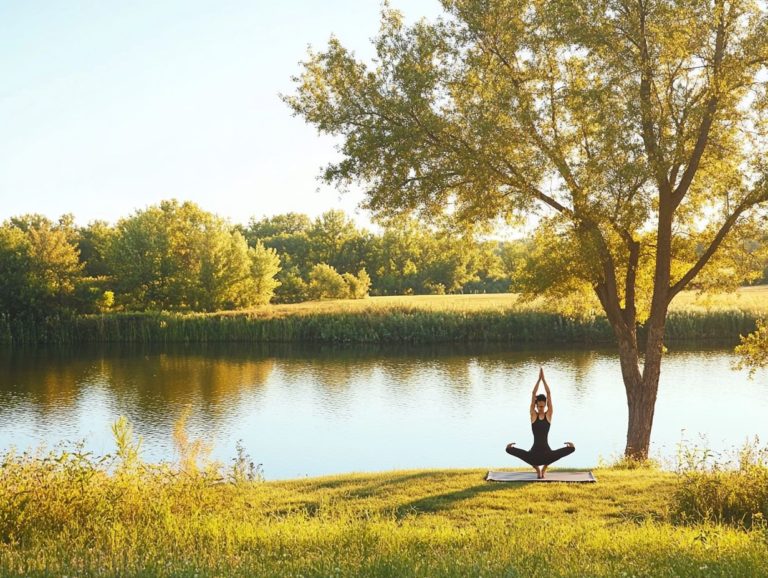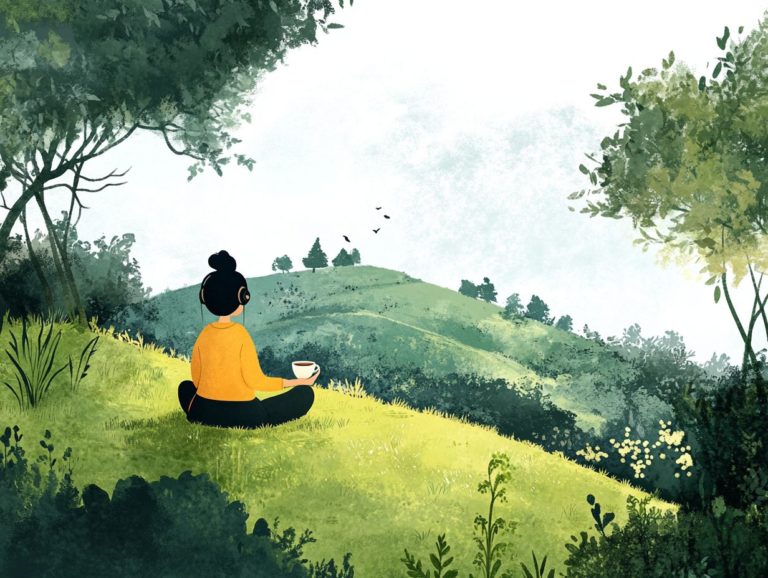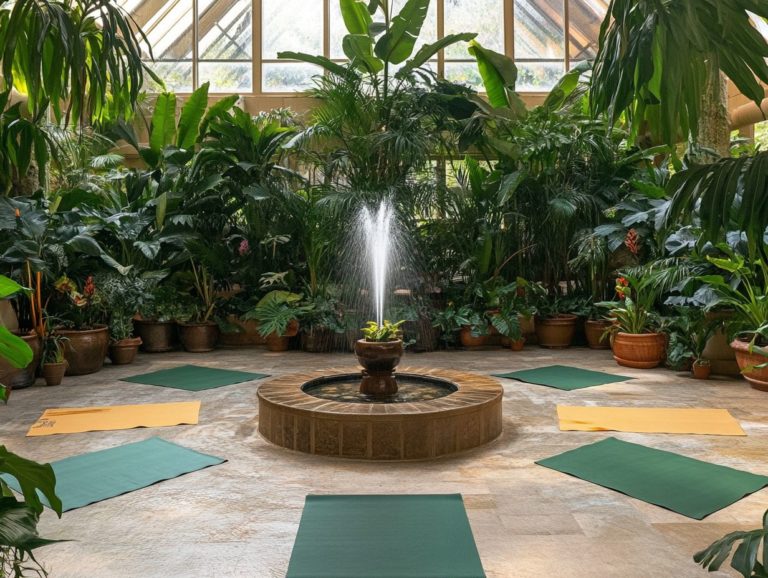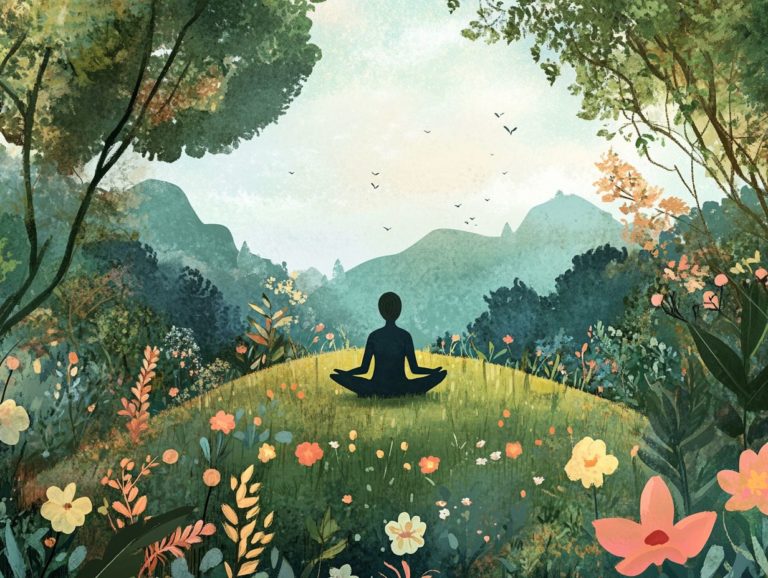Meditation for Beginners: Getting Started
Meditation has emerged as a transformative practice for enhancing overall well-being. You may be eager to start your journey. This article demystifies the essentials of meditation, beginning with its definition and purpose while delving into the myriad benefits it brings to both physical and mental health.
It will guide you in creating an inviting meditation space, choosing effective techniques, and establishing realistic goals. You ll discover how to effortlessly weave meditation into your daily routine, ensuring a lasting impact.
Immerse yourself in this journey and uncover the path to a more mindful, balanced life.
Contents
Key Takeaways:
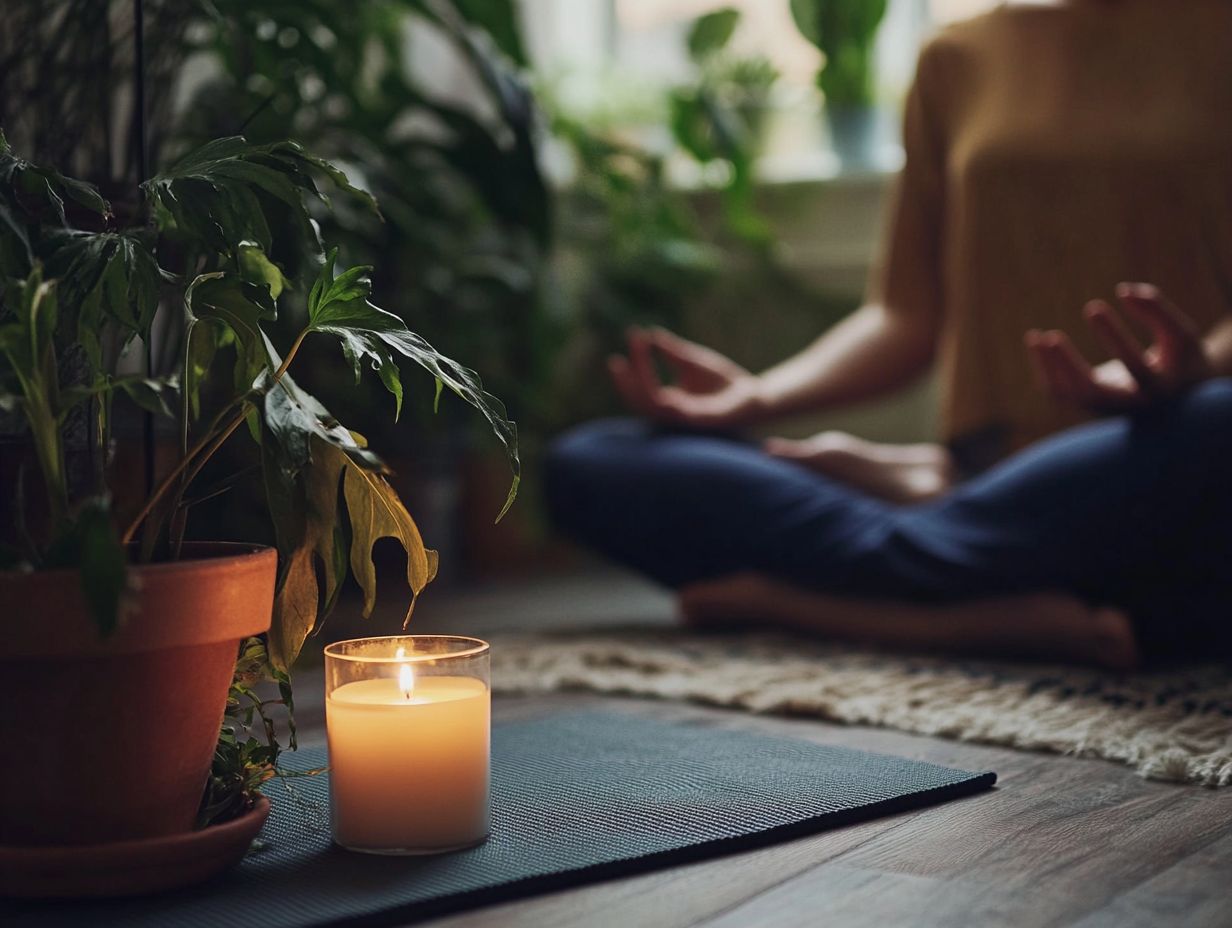
- Meditation helps improve mental and physical health.
- It reduces stress and anxiety.
- Setting realistic goals is important.
- Create a comfortable meditation space.
What is Meditation?
Meditation is a practice embraced by diverse cultures and traditions around the globe, designed to develop awareness, sharpen mental clarity, and enhance emotional well-being.
It includes various techniques, such as body scans, walking meditation, and loving-kindness meditation, each serving distinct purposes like stress reduction and emotional healing.
Esteemed meditation teachers like Sharon Salzberg and Barry Boyce have played key roles in popularizing this art, highlighting its significance in nurturing self-awareness and mental resilience.
In today s fast-paced world, meditation stands out as an essential tool for improving overall well-being and deepening your relationship with yourself.
Definition and Purpose
Meditation is about honing your focus. It helps achieve mental clarity and emotional calm while fostering self-awareness and mindfulness.
As you practice, you may find it easier to manage stress. You ll also gain a deeper understanding of your thoughts and feelings.
Dedicating time to reflection can improve your emotional health. This can lead to balanced relationships and enhanced overall well-being.
With regular meditation, you may find that your mental clarity heightens, allowing you to navigate life’s challenges with greater ease. The cultivation of mindfulness through meditation not only gives power to your journey of self-discovery but also nurtures resilience and emotional regulation, ultimately fostering a healthier outlook on life.
The Benefits of Meditation
The benefits of meditation are numerous, transcending simple relaxation. It significantly enhances your mental and physical health, promotes stress reduction, and fosters emotional clarity.
By incorporating meditation into your routine, you unlock a pathway to a more balanced and fulfilling life.
Physical and Mental Health Benefits
Meditation plays a pivotal role in enhancing both your mental and physical health by activating the relaxation response, reducing stress, and promoting an overall sense of well-being. This ancient practice invites you into a state of deep tranquility, helping to diminish anxiety and significantly elevate your daily life.
With regular practice, you may discover improved sleep patterns, allowing your mind and body to recover and rejuvenate effectively. Those who embrace mindfulness techniques often find their focus and clarity sharpened, making it easier for you to tackle tasks and confront challenges with a clear mind.
By weaving meditation into your daily routine, you might also feel better equipped to navigate emotional upheavals, enhancing your resilience and cultivating a healthier lifestyle.
How to Start Meditating

Embarking on a meditation practice necessitates a solid grasp of the fundamentals. You’ll want to choose the right meditation techniques that resonate with you, while also crafting a dedicated space that fosters a sense of mindfulness and tranquility.
Create a space that invites calm and focus. This will make your practice more enjoyable.
Start today and take the first step towards a calmer mind and a happier you!
Creating a Meditation Space
A meditation space should be serene. It nurtures mindfulness and encourages relaxation.
To achieve this, consider soft lighting that wraps the room in a warm glow. This promotes a sense of calm. Let natural light in during the day, and as evening falls, use gentle, dimmable lamps to enhance your experience.
Soothing decor is also important. Calming colors or nature-inspired art can act as visual anchors, helping ground your mind. Comfort is key, so invest in plush cushions or a supportive chair. These elements help you maintain focus by minimizing distractions.
When these components come together, they create a peaceful haven for your practice.
Choosing a Meditation Technique
Choosing the right meditation technique is vital for beginners. You have various options, such as guided meditation, body scan, walking meditation, and loving-kindness.
Each method offers unique advantages that can enhance your experience and help you build a lasting practice.
For instance, guided meditation provides direction and structure, which is comforting for beginners. If you seek deep relaxation and a stronger mind-body connection, try the body scan technique, where you focus on each part of your body to feel relaxed.
Walking meditation lets you practice mindfulness while moving, making it dynamic and engaging. Loving-kindness meditation fosters compassion toward yourself and others, enriching your relationships.
By exploring these techniques, you can find the perfect fit for your personal aspirations and lifestyle.
Tips for Beginners
As you start your meditation journey, effective tips are crucial for maintaining a consistent practice and overcoming common challenges.
Setting Realistic Goals
Setting realistic goals in your meditation practice allows for consistent daily sessions. This fosters gradual improvements in mindfulness and self-awareness.
When you establish clear, achievable objectives, you cultivate a sense of purpose that enhances your motivation. These goals can be as simple as meditating for a few minutes each day or focusing on specific techniques like breath awareness or loving-kindness.
Tracking your progress and celebrating small milestones can deepen your practice. This journey boosts your confidence and helps sustain a long-term commitment to meditation, leading to profound emotional and mental well-being changes.
Dealing with Distractions
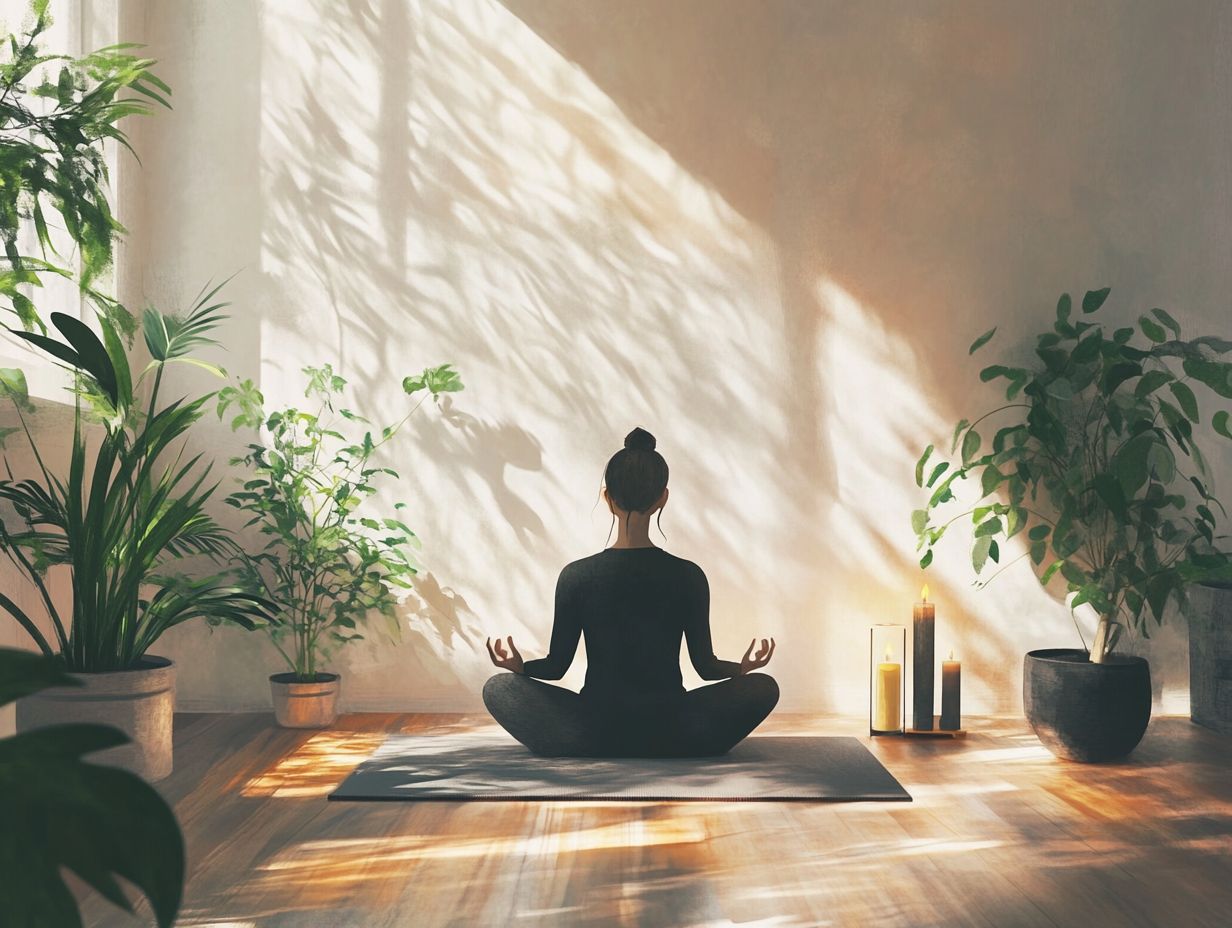
Dealing with distractions during meditation is common, but mindful techniques can elevate your focus and enhance your experience.
One effective strategy is to concentrate on your breath. Focus on each inhalation and exhalation to root yourself in the present moment. By honing in on the gentle rise and fall of your chest, you create a rhythmic anchor to navigate through external noises or wandering thoughts.
Visualization techniques, such as picturing a tranquil landscape or soothing light, can redirect your attention away from distractions. Embracing these methods may significantly improve your ability to stay present, leading to a more rewarding meditation journey.
Incorporating Meditation into Daily Life
Incorporating meditation into your daily life requires carving out moments for practice, even amidst a busy schedule.
This commitment to consistency is crucial, as it unlocks the long-term benefits that meditation can offer.
Finding Time and Consistency
Finding time for daily meditation can feel daunting. However, establishing a routine and prioritizing consistency can transform your practice into a fulfilling experience.
Start by carving out a specific time each day. Whether it’s early morning or just before bed, creating this habit enhances your focus and tranquility.
Design a cozy setup, like a dedicated corner or serene room, to make meditation inviting. Begin with short sessions of five to ten minutes to ease into the practice.
Over time, this approach can deepen your practice and nurture a sense of calm in your daily life.
Combining Meditation with Other Activities
Combining meditation with activities like walking or yoga can elevate your mindfulness. This makes it easier to fit meditation into your busy lifestyle.
When you walk mindfully, focus on each step and the sensations. This deepens your connection to nature and your inner thoughts.
Integrating meditation into yoga enhances physical well-being and promotes mental clarity. This approach turns routine activities into opportunities for awareness.
Embrace these techniques for a more balanced and fulfilling life!
Frequently Asked Questions
What is meditation and why is it beneficial for beginners?
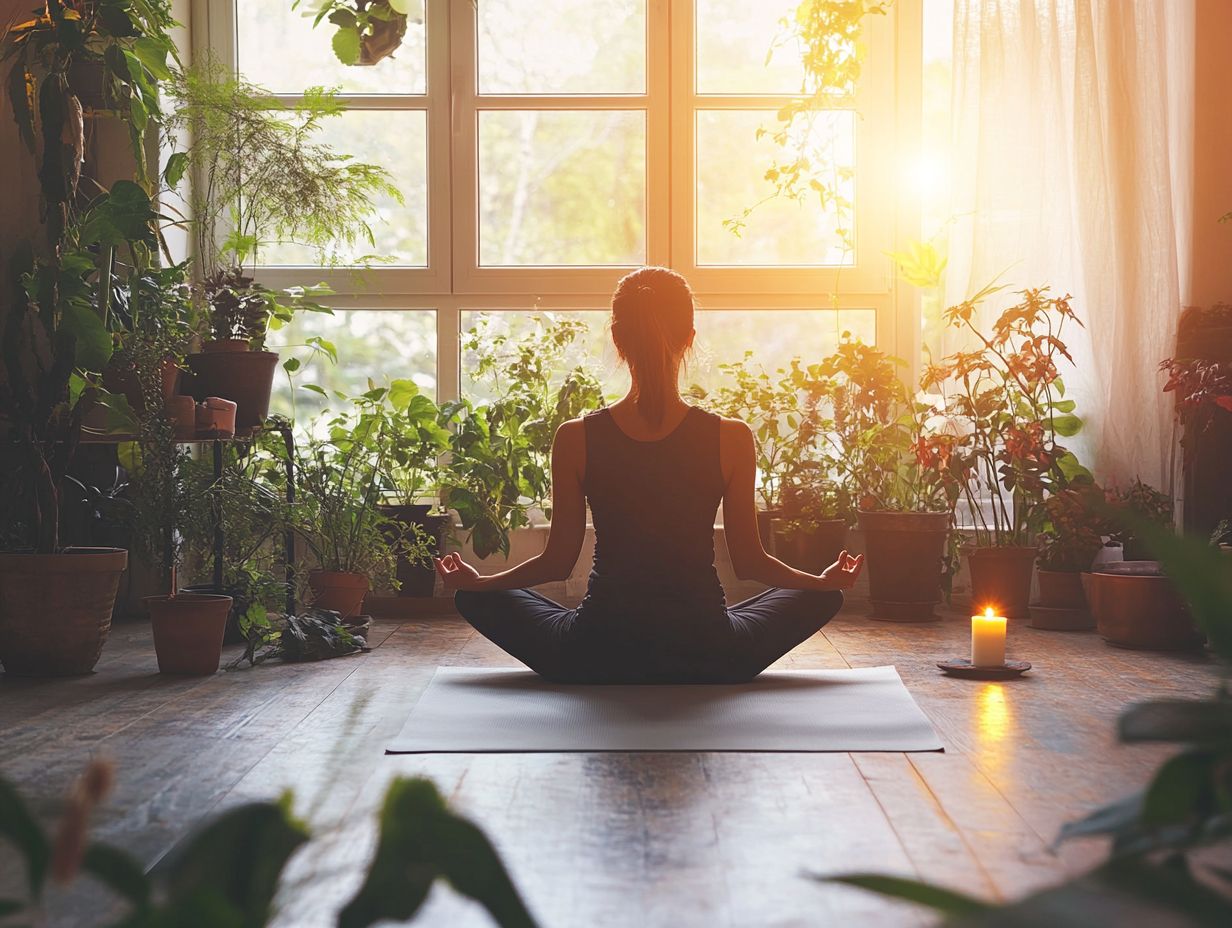
Meditation trains the mind to focus on the present moment. It reduces stress and improves concentration, especially beneficial for beginners managing everyday challenges.
What are some common misconceptions about meditation for beginners?
Many believe meditation requires a lot of time. In reality, just a few minutes daily can make a difference. Another myth is that it s about clearing your mind. The goal is to observe thoughts without getting caught up in them.
How do I get started with meditation?
Find a quiet, comfortable spot to sit or lie down. You can play gentle music or use a guided meditation audio. Close your eyes, focus on your breath, and let thoughts pass without judgment. Start with a few minutes and gradually increase as you feel comfortable.
What are some tips for staying consistent with meditation?
Incorporate meditation into your daily routine, such as in the morning or before bed. Set reminders or join a meditation group for support. Be patient with yourself and take breaks when needed.
What are some simple meditation techniques for beginners?
Simple techniques include focusing on your breath, a body scan, and loving-kindness meditation. In breath-focused meditation, pay attention to the sensations of your breath. For body scan, bring awareness to different body parts. In loving-kindness meditation, send well wishes to yourself and others. Experiment to find what fits you best!
What are some resources for beginners to learn more about meditation?
Many resources are available, including books, podcasts, and videos. Various meditation apps and online courses offer guided sessions and tips. Consider seeking guidance from a teacher or attending a retreat for deeper immersion.
Ready to start your meditation journey? Dive into these resources and embrace the benefits!

